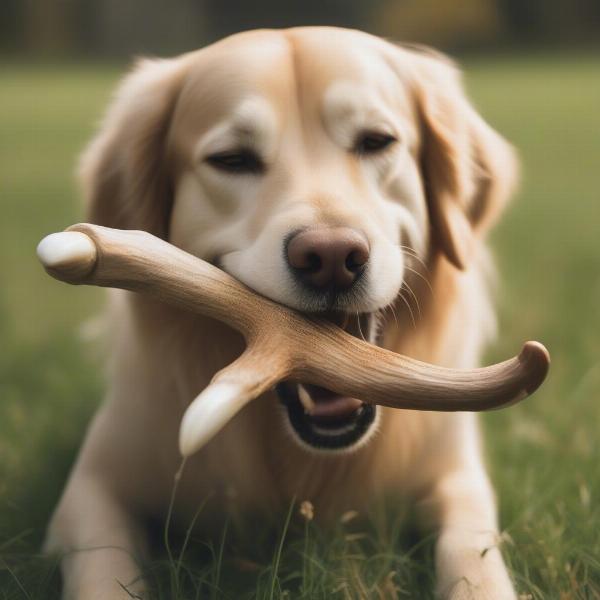Dog antler chews have become a popular choice for pet owners seeking a natural and long-lasting chew for their furry friends. But are they the right choice for your dog? This comprehensive guide will delve into the benefits, risks, and everything you need to know about dog antler chews, helping you make an informed decision for your canine companion.
Understanding the Allure of Antler Chews
Antler chews are naturally shed antlers from deer, elk, moose, or caribou. They are marketed as a durable, odor-free, and nutritious alternative to traditional rawhide chews. Many pet owners are drawn to their natural origin and the potential dental benefits they offer. But before you rush to buy a bag, it’s crucial to understand both the pros and cons.
 Dog Chewing Antler
Dog Chewing Antler
Benefits of Antler Chews for Dogs
Antler chews offer several potential benefits for dogs, including:
- Dental Health: The chewing action can help scrape away plaque and tartar buildup, promoting cleaner teeth and fresher breath.
- Long-lasting: Compared to many other chews, antlers are incredibly durable and can last for weeks or even months, depending on the dog’s chewing habits.
- Natural Source: They are a natural product, free from artificial ingredients, colors, and flavors.
- Low Odor: Unlike some other chews, antlers have minimal odor, making them a more pleasant option for owners.
- Nutrient-Rich: Antlers contain essential minerals like calcium and phosphorus, which can contribute to a dog’s overall health.
Potential Risks and Considerations
While antler chews offer advantages, it’s essential to be aware of the potential downsides:
- Hard Surface: The hardness of antlers can pose a risk of tooth fractures, especially for aggressive chewers.
- Splintering: While less common than with bones, antlers can splinter, potentially causing injury to the mouth, throat, or digestive tract.
- Digestibility: Antlers are not easily digestible. Large pieces swallowed can cause blockages, requiring veterinary intervention.
- Not Suitable for All Dogs: Puppies, senior dogs, or dogs with pre-existing dental issues should not be given antler chews.
Choosing the Right Antler Chew
Choosing the correct size and type of antler chew is vital for your dog’s safety.
- Size: Select an antler that is larger than your dog’s mouth to prevent swallowing whole.
- Type: Split antlers are a good option for less aggressive chewers as they expose the softer marrow inside. natural dental chews for dogs offer a great variety for your pet’s dental needs.
- Supervision: Always supervise your dog while they are chewing on an antler.
Are Antler Chews Right for Your Dog?
Dr. Emily Carter, DVM, advises, “Antler chews can be a beneficial addition to a dog’s chew toy collection, but they are not without risks. Always choose the appropriate size and supervise your dog closely. If you notice any signs of excessive wear on the teeth or potential splintering, discontinue use immediately.”
Alternatives to Antler Chews
If you’re looking for other natural chew options, consider canophera coffee wood dog chew or dog joy treats. You can also find valuable information regarding antlers and dogs through the website elk antler dog
Dr. David Miller, a veterinary behaviorist, adds, “Providing a variety of chew toys with different textures and densities can help satisfy a dog’s natural chewing instinct and prevent boredom.”
Conclusion
Dog antler chews can be a valuable and long-lasting chew option, but careful consideration and supervision are crucial. By understanding the potential benefits and risks, and by choosing the right type and size for your dog, you can ensure a safe and enjoyable chewing experience for your canine companion. Remember to always consult with your veterinarian if you have any concerns about your dog’s dental health or chewing habits.
FAQs
- Are antler chews safe for puppies? No, antler chews are too hard for puppies and can damage their developing teeth.
- Can antlers splinter? Yes, although less common than with bones, antlers can splinter, so supervision is essential.
- How long do antler chews last? Antlers are very durable and can last for weeks or even months.
- What are the benefits of antler chews? They can help clean teeth, provide mental stimulation, and offer a long-lasting chewing experience.
- Are there any alternatives to antler chews? Yes, options include natural rubber toys, nylon chews, and other durable chew toys.
- What should I do if my dog swallows a large piece of antler? Contact your veterinarian immediately.
- Where can I buy quality antler chews? Look for reputable pet supply stores or online retailers that specialize in natural dog products. antler dog chews
ILM Dog is a leading international online resource dedicated to providing dog owners worldwide with expert advice and practical information on all aspects of dog care and wellbeing. From breed selection to senior dog care, we cover everything you need to know to raise a happy and healthy canine companion. We also offer a comprehensive range of products and accessories to enhance your dog’s life. For expert guidance, contact us at [email protected] or call us at +44 20-3965-8624. Visit ILM Dog for more information.